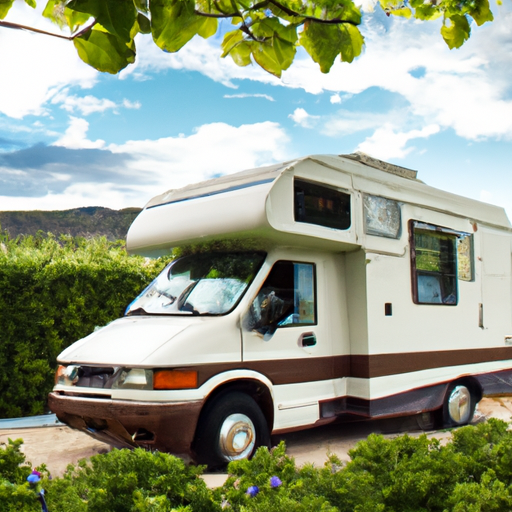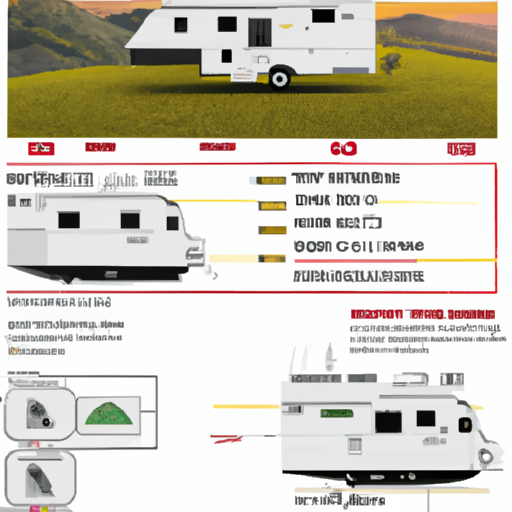In this article, we will explore the costs of living in a camper van and provide you with a breakdown of the expenses you can expect. We’ll cover essentials such as fuel, food, accommodation, and insurance, as well as other budget considerations. By the end of this article, you’ll have a clearer idea of the financial commitment involved in living life on the road in a camper van. Living in a camper van can be an exciting and adventurous lifestyle choice. It offers freedom, flexibility, and the opportunity to explore new places. However, it’s important to consider the financial aspects before making the decision to live in a camper van. In this article, we will explore the various costs associated with living in a camper van and help you determine how much money you will need to support this lifestyle.

Researching Different Camper Van Options
Before diving into the financial aspect, it’s crucial to research and consider different camper van options. There is a wide range of camper vans available in the market, from basic conversions to luxurious ones. Each option comes with its own set of costs, so it’s important to assess your needs and budget before making a decision.
Determining Your Budget
Once you have a clear understanding of the camper van options available, it’s time to determine your budget. Creating a realistic budget will help you understand how much money you need to live comfortably in a camper van. Consider factors such as your income, savings, and expenses while establishing your budget for living in a camper van.
Considering New vs. Used Camper Vans
When it comes to purchasing a camper van, you have the option to buy either new or used. New camper vans offer the advantage of being in excellent condition and often come with warranties. However, they can be quite expensive. On the other hand, used camper vans are more affordable but may require more maintenance and repairs. Consider your budget and personal preferences while deciding between new and used camper vans.
Factoring in Additional Costs
Apart from the initial cost of purchasing a camper van, there are several additional costs to consider. These include insurance, registration fees, taxes, and any modifications or customization you may want to make to your vehicle. It’s important to factor in these costs to get an accurate estimate of your overall expenses.
Calculating Living Expenses
Living expenses make up a significant portion of your budget when living in a camper van. Here are some key factors to consider when calculating your living expenses:
Determining Daily Living Costs
When living in a camper van, your daily living costs will be different from a traditional lifestyle. You will need to account for costs such as groceries, toiletries, and household supplies. These expenses can vary depending on your lifestyle and preferences.
Budgeting for Food and Drinks
Food is a necessary expense, and it’s important to budget accordingly. Consider your eating habits and the cost of groceries in the areas you plan to visit. Eating out can also add up quickly, so it’s essential to balance eating out with cooking your meals in the camper van.
Including Utility Expenses
Living in a camper van requires utilities such as electricity and water. Depending on your setup, you may need to pay for campground fees to access these utilities. It’s important to factor in these costs when creating your budget.
Accounting for Insurance and Registration
Just like any other vehicle, your camper van needs to be insured and registered. These costs can vary depending on the type of van, your location, and your driving record. It’s essential to include insurance and registration costs in your budget to avoid any surprises.
Maintenance and Repairs
Maintenance and repairs are unavoidable expenses when living in a camper van. Here are some key considerations regarding maintenance and repairs:
Allocating Budget for Regular Maintenance
Regular maintenance is essential to keep your camper van in good working order. This includes oil changes, tire rotations, and other routine maintenance tasks. Allocate a budget for regular maintenance to ensure your vehicle remains in excellent condition.
Considering Potential Repair Costs
Just like any other vehicle, camper vans can experience breakdowns and require repairs. It’s crucial to set aside some money for unexpected repairs. Consider the age and condition of your van when allocating funds for potential repairs.
Researching DIY Maintenance
If you have some mechanical skills, you can save money on maintenance and repairs by doing them yourself. However, it’s important to consider your abilities and the complexity of the task before attempting any DIY repairs. Some repairs may require professional assistance, which should be factored into your budget.
Finding Reliable Mechanics
If you’re not comfortable with DIY repairs or need professional assistance, it’s important to find reliable mechanics who specialize in camper vans. Research local mechanics and read reviews to ensure you find someone trustworthy and experienced.

Campground and Parking Fees
When living in a camper van, you will need a place to park and camp. Here are some considerations regarding campground and parking fees:
Researching Campground Options
There are countless campgrounds available, ranging from basic to luxury resorts. Research different campgrounds in the areas you plan to visit and compare their costs. Consider the facilities they offer, such as electricity, water, and showers.
Comparing Campground Costs
Campground costs can vary significantly depending on location and amenities. Basic campgrounds might be more affordable, while luxury resorts can be quite expensive. Balance your budget and preferences to find campgrounds that suit your needs without breaking the bank.
Factoring in Long-Term Parking Fees
If you plan to stay in one location for an extended period, consider long-term parking options. Some campgrounds offer discounted rates for long-term stays. Alternatively, you can also explore options such as boondocking or free overnight parking.
Exploring Free Overnight Parking Options
If you’re looking to save money on campground fees, there are various free overnight parking options available. These include Walmart parking lots, rest areas, and BLM (Bureau of Land Management) lands. Research local regulations and guidelines before using these free parking options.
Fuel and Transportation
Fuel and transportation costs are an important aspect to consider when living in a camper van. Here are some considerations regarding fuel and transportation:
Budgeting for Fuel Expenses
Camper vans are not known for their fuel efficiency. Before hitting the road, calculate your estimated fuel expenses based on your intended travel routes and mileage.
Estimating Mileage and Fuel Efficiency
Consider the size and weight of your camper van, as well as your driving habits, when estimating mileage and fuel efficiency. This will help you determine your average fuel expenses and plan your budget accordingly.
Considering Public Transportation Costs
While your camper van is your primary mode of transportation, there may be instances where public transportation is more convenient or cost-effective. Budget for occasional public transportation expenses, such as bus or train tickets, especially in urban areas.
Planning for Leisure Travel
Living in a camper van provides ample opportunity to explore new places. Consider setting aside a budget for leisure travel, including admission fees to attractions and events. Research free and affordable activities in the areas you plan to visit to stretch your budget further.
Healthcare and Medical Expenses
It’s important to prioritize your health and include healthcare and medical expenses in your budget. Here are some key considerations:
Understanding Health Insurance Options
Ensure that you have comprehensive health insurance coverage while living in a camper van. Research different health insurance options and find one that suits your needs and budget.
Budgeting for Routine Medical Check-ups
Routine medical check-ups are crucial for your overall well-being. Include the cost of these check-ups in your budget and consider them as a regular expense.
Accounting for Prescription Medications
If you require prescription medications, it’s important to include the cost of these medications in your budget. Consult with your healthcare provider to estimate the monthly cost and budget accordingly.
Emergency and Unexpected Medical Expenses
Accidents and unexpected medical expenses can happen to anyone. It’s crucial to create an emergency fund and allocate some funds specifically for unexpected medical costs. Having a financial cushion will provide peace of mind and help you navigate such situations without added stress.
Internet and Communication
Staying connected while living in a camper van is essential. Here are some considerations regarding internet and communication expenses:
Finding Reliable Mobile Internet Solutions
To stay connected on the road, research reliable mobile internet solutions such as mobile hotspots or data plans from reputable providers. Consider the coverage and speed of these solutions and budget accordingly.
Comparing Internet Service Providers
If you plan to stay in one location for an extended period, consider researching internet service providers in that area. Some campgrounds offer Wi-Fi included in their fees, while others may require an additional cost.
Budgeting for Monthly Data Plans
If you rely heavily on the internet for work or entertainment, it’s important to budget for monthly data plans. Consider your internet usage and the cost of data plans when creating your budget.
Staying Connected on the Road
Maintaining communication while on the road is essential for safety and convenience. Budget for mobile phone bills and any other communication methods you may use while living in a camper van.
Entertainment and Recreation
Living in a camper van provides ample opportunities for entertainment and recreation. Here are some considerations regarding entertainment and recreation expenses:
Budgeting for Leisure Activities
Consider your interests and hobbies and set aside a budget for leisure activities. This can include activities such as hiking, fishing, biking, or visiting local attractions and events.
Exploring Outdoor Recreation Options
One of the significant advantages of living in a camper van is the access to nature and outdoor activities. Take advantage of these opportunities and explore outdoor recreation options that fit your budget.
Considering Costs of Sightseeing
While traveling to new places, you may come across popular tourist destinations and sightseeing opportunities. Research the costs associated with visiting these attractions and incorporate them into your budget.
Seeking Affordable Entertainment
Living in a camper van doesn’t mean you have to miss out on entertainment. Look for free or affordable entertainment options such as festivals, local markets, or community events. Engaging with the local community can also provide memorable and low-cost entertainment.
Unexpected Expenses and Contingency Planning
No matter how well you plan, unexpected expenses can arise. It’s important to create an emergency fund and have a contingency plan in place. Here are some considerations for unexpected expenses:
Creating an Emergency Fund
An emergency fund is crucial to handle unexpected expenses such as repairs, medical emergencies, or legal matters. Save a portion of your income or allocate a specific amount each month to build your emergency fund.
Preparing for Repairs and Replacements
As mentioned earlier, maintenance and repairs are part of living in a camper van. However, it’s important to prepare for bigger repairs or replacements that may arise unexpectedly. Set aside additional funds to cover these costs.
Accounting for Unforeseen Circumstances
Unforeseen circumstances such as bad weather, accidents, or changes in plans can impact your budget. Consider these factors and allocate some funds to handle such situations without straining your finances.
Reevaluating and Adjusting Your Budget
Living in a camper van is a journey, and your financial situation may change over time. Regularly reevaluate your budget and make adjustments as necessary. This will help you stay on track and ensure that you’re living within your means.
Conclusion
Living in a camper van can be an amazing experience, but it’s essential to understand the financial commitments involved. By considering the various costs outlined in this article, you can determine how much money you need to comfortably live in a camper van. It’s important to create a realistic budget, stay flexible, and be prepared for unexpected expenses. With proper planning and budgeting, living in a camper van can be a rewarding and fulfilling lifestyle choice.
